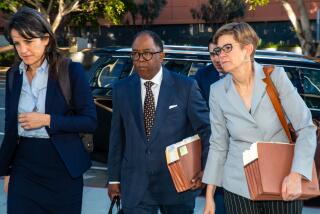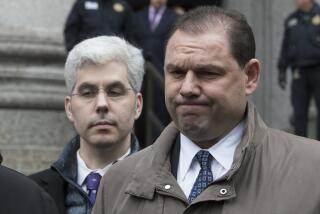12 of 13 Counts Against Hedgecock Overturned : Politics: High Court reverses felony perjury counts on which the former San Diego mayor was convicted.
- Share via
SAN FRANCISCO — Changing the plot though not ending what former San Diego Mayor Roger Hedgecock calls “the country’s longest-running political soap opera,” the state Supreme Court on Thursday reversed Hedgecock’s perjury convictions and set aside his remaining conspiracy count until his claims of jury tampering are reconsidered.
In a decision that Hedgecock hailed as “a pretty good victory,” the high court threw out 12 of the 13 felony counts on which Hedge cock had been convicted by a Superior Court jury in October, 1985, and ordered additional proceedings on the sole conspiracy charge because of the “serious nature” of the defense’s tampering allegations. The outcome of that hearing, prosecutors said, will determine whether they decide to retry Hedgecock on the perjury charges overturned Thursday.
As with so much else in the case, the two sides offered divergent interpretations of Thursday’s ruling. Calling the decision “a triple that knocked in some runs,” Hedgecock attorney Charles Sevilla billed it as a lopsided if not definitive victory. San Diego County Dist. Atty. Edwin Miller Jr., however, described it as “half a loaf” in which both sides won and lost something. “We still have a felony conviction and the ability to retry Hedgecock,” he said.
“My first thought was relief that we’re finally getting somewhere,” Hedgecock said on his KSDO radio talk show Thursday, where he presided over a lengthy discussion of his case via an interview with Sevilla, congratulatory calls from listeners and on-air questions from reporters in the studio.
The ruling either brought the 44-year-old Hedgecock closer to possible vindication, a step nearer to a one-year jail term or--in the scenario least attractive to all parties involved--a potential third trial on the alleged campaign-law and financial disclosure violations that forced him from office in December, 1985.
Any of those could result from the hearing that the Supreme Court justices ordered Thursday to determine whether Hedgecock’s conspiracy conviction was tainted, as the defense contends, by allegations that a court bailiff improperly pressured jurors to return a swift verdict and provided them with liquor after their daily deliberations.
The jury-tampering charges surfaced only days after a Superior Court jury convicted Hedgecock of conspiring with former principals of the now-defunct La Jolla investment firm of J. David & Co. to funnel more than $350,000 in illegal donations to his 1983 mayoral campaign through a political consulting firm owned by a close friend. The perjury counts charged that Hedgecock falsified financial disclosure reports to conceal that aid.
After Hedgecock’s first trial ended in a mistrial in February, 1985, with the jury deadlocked 11 to 1 in favor of conviction, he was convicted in his second trial eight months later. His one-year jail sentence and $1,000 fine have been set aside pending the outcome of his appeal.
In Thursday’s decision, written by Justice Joyce L. Kennard, the court ruled 5 to 2 that the 12 perjury counts against Hedgecock must be overturned because then-Superior Court Judge William L. Todd Jr. improperly ruled that the statements or omissions on the disclosure forms were sufficient--or, in legal jargon, “material” enough--to support the charges. That determination should have been made by jurors, not the judge, the court said.
“What (Todd) did was improperly take away the jury’s historic role and decide the case himself,” Hedgecock said.
The essential question involved in the arcane but critical “materiality” issue is whether certain omissions or errors on Hedgecock’s personal and campaign financial reports warranted his perjury convictions. In other words, is any error on a form signed under penalty of perjury adequate grounds for a conviction, as prosecutors argued, or could some errors be so insignificant as to be legally negligible?
In oral arguments before the high court in June, Sevilla argued that the jury should have weighed the significance of the mistakes on Hedgecock’s financial statements--some of which he disputed were mistakes, while characterizing others as inadvertent errors later corrected by amendments.
On the remaining conspiracy charge, the justices ruled unanimously to order a hearing that could lead to a subsequent, full-blown evidentiary hearing--complete with questioning of the jurors--over the misconduct allegations. Because the high court’s ruling will not become official for one month, that first hearing likely will not be held until at least late October.
In denying Hedgecock a new trial, Todd had refused defense requests to permit testimony by the jurors and bailiffs, deciding the issue solely on the basis of their sworn statements and the competing attorneys’ arguments. Todd, who since has been elevated to the 4th District Court of Appeal, erroneously concluded that he lacked authority to summon witnesses to a hearing, the high court said.
Under Thursday’s ruling, a Superior Court judge now must decide whether to hold a hearing on the charges of misconduct and then determine whether to grant a retrial on the conspiracy charge or uphold the conviction.
Miller said he would not decide whether to retry Hedgecock on the perjury counts until the fate of the conspiracy conviction is resolved in court--a process that, given the likelihood of appeals, could postpone a definitive conclusion for months.
Emboldened by the decision, defense attorney Sevilla expressed confidence that the conspiracy conviction would be overturned in that forthcoming hearing.
“We have a strong case for showing taint, and I think it is going to get even stronger,” he said. “We didn’t get everything we wanted, but this was very, very encouraging.”
Despite seeing 12 of the 13 counts overturned and serious questions raised about the remaining one, Miller eschewed characterizing the ruling as a setback for prosecutors, preferring to describe it as a standoff pending at least one more legal battle.
“We got a conviction on the conspiracy count . . . and the defendant got a reversal of the felony charges,” Miller said.
Robert Foster, the supervising deputy state attorney general who argued the case before the Supreme Court, also sought to accentuate whatever victory he could find in the ruling.
“Normally, a reversal guts a decision and you have to start over, but this decision doesn’t gut the conspiracy count,” Foster said. “The court said a judge could hold a hearing on that, not that one had to be held.”
At the forthcoming hearing on the jury-tampering charges, Miller said, prosecutors will repeat their argument that the tampering charges did not influence Hedgecock’s convictions and should be dismissed without a full evidentiary hearing involving possible testimony by jurors.
But Sevilla said he will be “screaming like crazy” that, if a judge decides that a full hearing is merited, then the conspiracy conviction should immediately be dismissed because any such hearing would be flawed by jurors’ faded memories, making it difficult to reconstruct the key details and nuances related to the tampering charges.
In response, Foster contends that the high court, in specifically ordering a judge to consider holding such a hearing, “rejected that patently absurd argument”--which he calls a “ticking time bomb” designed to protect defendants whose very appeals produce the time delays they later could cite as grounds for reversal of their conviction.
“There is an obscure irony to this case,” Foster added. “Hedgecock openly criticized former Chief Justice Rose Bird for using technicalities in reversing criminal convictions, and now he’s the beneficiary of one of those technicalities.”
Hedgecock offered a markedly different perspective on his radio show.
“Directing a jury verdict is not a technicality--it’s a kangaroo court,” he said. “Tampering with the jury, pressuring the jury with booze and stories . . . is not a technicality.”
In sworn affidavits, two jurors alleged that court bailiff Al Burroughs Jr. improperly discussed the case and the progress in their deliberations while they were sequestered at a Mission Valley hotel. According to the two jurors--whose claims were contradicted in part by statements from the other 10 jurors--Burroughs allegedly helped jurors define the legal term reasonable doubt, pressured them to reach a verdict quickly by reminding them of the cost of the hotel where they were staying and provided jurors, including one minor, with alcoholic beverages after their daily deliberations.
In Thursday’s decision, the high court rejected prosecutors’ contentions that allowing the questioning of jury members about their conduct would discourage prospective jurors from serving or stifle free and open jury deliberations. Many other states permit such post-verdict interrogations and there have been no reported adverse effects, the justices said.
The court also took the opportunity to issue a general warning to trial courts to make sure that bailiffs make no statements to jurors that can be construed as an attempt to influence deliberations.
“Any comment by a bailiff that is likely to influence the deliberative processes of the jury constitutes serious misconduct,” Kennard wrote.
The allegations of alcohol use by jurors were “equally serious” matters, the court said. While a juror need not abstain when not deliberating, the use of alcohol that later “renders the juror unable to competently perform” duties constitutes misconduct, Kennard said.
Although Thursday’s decision ended a major chapter in the protracted dispute, the likelihood of future appeals of the decision on the jury-tampering charges and the possibility of a third trial on the perjury charges underlines how the case’s circuitous route is far from complete.
Foster glumly conceded that point Thursday when asked when he expects a final resolution.
“The never-ending soap opera will go on,” he said, smiling wryly. “My children may see a conclusion to it.”
WHAT’S NEXT
Former San Diego Mayor Roger Hedgecock’s case will now return to Superior Court in San Diego, where a judge will determine whether to hold a full evidentiary hearing into defense allegations of jury-tampering. After a judge rules on the jury tampering question and whether Hedgecock’s conspiracy conviction should stand, San Diego County Dist. Atty. Edwin Miller Jr. will decide whether to retry Hedgecock on the 12 perjury counts tossed out by the state Supreme Court Thursday.
More to Read
Sign up for Essential California
The most important California stories and recommendations in your inbox every morning.
You may occasionally receive promotional content from the Los Angeles Times.













